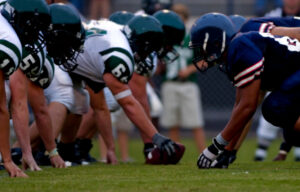It’s that time of year again. Nothing eases those end-of-summer blues like the kick-off of football season. Whether you’re partial to NFL, NCAA, varsity, or little league, for many, the return of football season means the return of all that’s right with the world. It also means the return of fantasy football.

For those of you pursuing NFL jobs, you might think of your fantasy football team as the ultimate sports internship. While that may be a bit of a stretch (and please don’t put your last league championship on your resume!), there are lessons to be learned from fantasy football that can help you in your search for NFL jobs. Now, if you’re reading this blog, chances are good that you are at least familiar with how fantasy football works (and if so, please skip this paragraph), but for the uninitiated, here’s a quick review.
Fantasy football allows an individual to draft a hypothetical team of real NFL players to compete against other hypothetical teams. Using a predetermined scoring system that accounts not only for touchdowns and field goals but also passing yards, rushing yards, etc., the owners of said teams (who make up the league) will track the real-life performance of their individual players to arrive at a score for their teams. The various teams within a given fantasy football league “play” each other every week to ultimately determine the league champion (and the biggest loser, a title I may or may not have claimed last season).
The level of commitment involved with running a fantasy football team can be pretty intense. But it’s not just this intensity that makes fantasy football a good model for the job search. I argue that the same tactics that win fantasy football championships are also helpful in your search for NFL jobs, NCAA jobs, NBA jobs, and more.
5 Fantasy Football Tactics to Use in Your Job Search
1. Do your research
–
Fantasy football enthusiasts may spend weeks researching players before going into the draft, factoring in the player’s position, past performance, and even their health. Likewise, job seekers must do extensive research to identify the companies they want to pursue and the people in their network that can help them succeed, factoring in their position, past performance, and in the case of a potential employer, their fiscal health!
2. Know your stats
–
Before and after the draft, owners of fantasy football teams study players’ stats to gauge what kind of performance they may give on a given Sunday. Job seekers must know their own stats and be aware of which professional accomplishments will be most impressive to a potential company.
3. Change tactics regularly
–
Dedicated fantasy football players will meticulously plan each week’s lineup for maximum effectiveness. Job seekers should also tweak their strategy depending on the company and the job they are applying for. Just like the starting lineup, your resume, cover letter, and even the way you prepare for the interview should never look the same way twice.
4. Improve your odds
–
What’s the best way to increase your chances of winning a fantasy football league? Play in multiple leagues, of course. This doesn’t mean you should apply to every job you’re remotely qualified for, but you should employ multiple tactics and not wait to hear back after each application or interview before moving on to the next.
5. Keep playing
–
Winning your league’s championship is the ultimate goal, but achieving it doesn’t mean you won’t play again next year. For the job seeker, getting a job is the end goal, but you should keep playing even after you’ve started the new job. Your game may not be as intense, but it’s still smart to stay in touch with what’s happening in the job market for your industry.
Whether you are an avid fantasy football enthusiast or if this blog post is your introduction to the topic, the parallels are hopefully clear. Dedication, research, and commitment, along with a little luck, can get you to your goal – whether that goal is a league championship or a job with the NFL.





